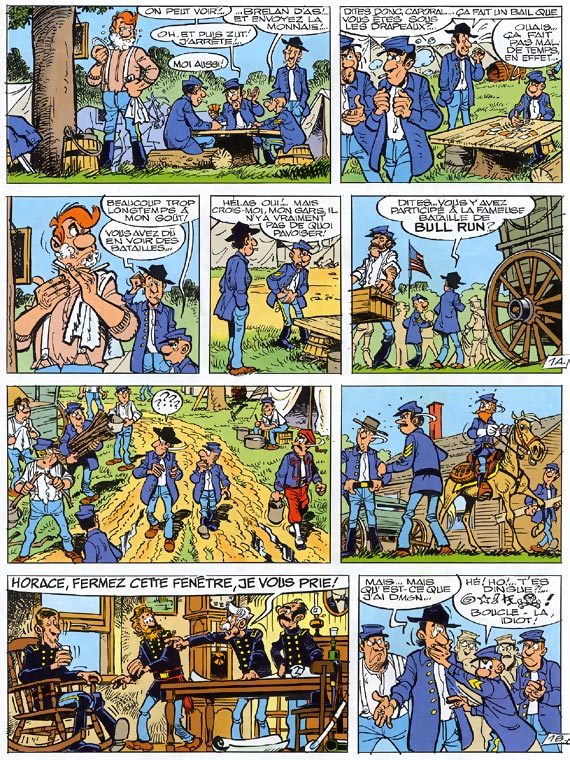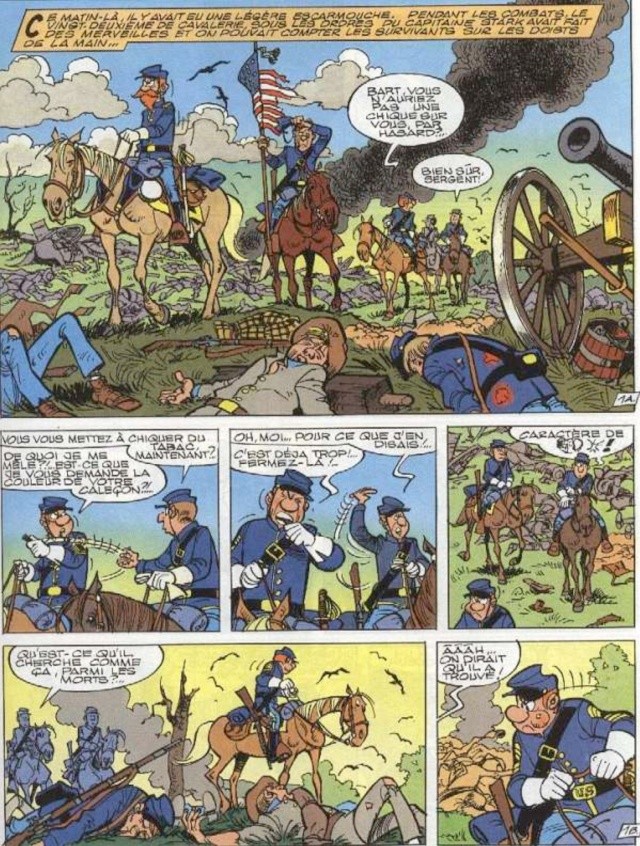

Les U.S.A. et la guerre : une relation intime
"War is not nice."
Barbara Bush (1925 - )
"War may sometimes be a necessary evil. But no matter how necessary, it is always an evil, never a good. We will not learn how to live together in peace by killing each other's children."
Jimmy Carter (1924 - )
"Never, never, never believe any war will be smooth and easy, or that anyone who embarks on the strange voyage can measure the tides and hurricanes he will encounter. The statesman who yields to war fever must realize that once the signal is given, he is no longer the master of policy but the slave of unforeseeable and uncontrollable events."
Sir Winston Churchill (1874 - 1965)
"War is a cowardly escape from the problems of peace."
Thomas Mann (1875 - 1955)
"The art of war is simple enough. Find out where your enemy is. Get at him as soon as you can. Strike him as hard as you can, and keep moving on."
Ulysses S. Grant (1822 - 1885)
| Little Women, Louisa May Alcott, 1868 Part One Chapter One « Playing Pilgrims » (…) “It’s the best we’ve had yet,” said Meg, as the dead villain sat up and rubbed his elbows. “I don’t see how you can write and act such splendid things, Jo. You’re a regular Shakespeare!” exclaimed Beth, who firmly believed that her sisters were gifted with wonderful genius in all things. “Not quite,” replied Jo modestly. “I do think The Witches Curse, an Operatic Tragedy is rather a nice thing, but I’d like to try Macbeth, if we only had a trapdoor for Banquo. I always wanted to do the killing part. ‘Is that a dagger that I see before me?” muttered Jo, rolling her eyes and clutching at the air, as she had seen a famous tragedian do. “No, it’s the toasting fork, with Mother’s shoe on it instead of the bread. Beth’s stage-struck!” cried Meg, and the rehearsal ended in a general burst of laughter. “Glad to find you so merry, my girls,” said a cheery voice at the door, and actors and audience turned to welcome a tall, motherly lady with a ‘can I help you’ look about her which was truly delightful. She was not elegantly dressed, but a noble-looking woman, and the girls thought the gray cloak and unfashionable bonnet covered the most splendid mother in the world. “Well, dearies, how have you got on today? There was so much to do, getting the boxes ready to go tomorrow, that I didn’t come home to dinner. Has anyone called, Beth? How is your cold, Meg? Jo, you look tired to death. Come and kiss me, baby.” While making these maternal inquiries Mrs. March got her wet things off, her warm slippers on, and sitting down in the easy chair, drew Amy to her lap, preparing to enjoy the happiest hour of her busy day. The girls flew about, trying to make things comfortable, each in her own way. Meg arranged the tea table, Jo brought wood and set chairs, dropping, over-turning, and clattering everything she touched. Beth trotted to and fro between parlor kitchen, quiet and busy, while Amy gave directions to everyone, as she sat with her hands folded. As they gathered about the table, Mrs. March said, with a particularly happy face, “I’ve got a treat for you after supper.” A quick, bright smile went round like a streak of sunshine. Beth clapped her hands, regardless of the biscuit she held, and Jo tossed up her napkin, crying, “A letter! A letter! Three cheers for Father!” “Yes, a nice long letter. He is well, and thinks he shall get through the cold season better than we feared. He sends all sorts of loving wishes for Christmas, and an especial message to you girls,” said Mrs. March, patting her pocket as if she had got a treasure there. “Hurry and get done! Don’t stop to quirk your little finger and simper over your plate, Amy,” cried Jo, choking on her tea and dropping her bread, butter side down, on the carpet in her haste to get at the treat. Beth ate no more, but crept away to sit in her shadowy corner and brood over the delight to come, till the others were ready. “I think it was so splendid in Father to go as chaplain when he was too old to be drafted, and not strong enough for a soldier,” said Meg warmly. “Don’t I wish I could go as a drummer, a vivan — what’s its name? Or a nurse, so I could be near him and help him,” exclaimed Jo, with a groan. “It must be very disagreeable to sleep in a tent, and eat all sorts of bad-tasting things, and drink out of a tin mug,” sighed Amy. “When will he come home, Marmee?” asked Beth, with a little quiver in her voice. “Not for many months, dear, unless he is sick. He will stay and do his work faithfully as long as he can, and we won’t ask for him back a minute sooner than he can be spared. Now come and hear the letter.” They all drew to the fire, Mother in the big chair with Beth at her feet, Meg and Amy perched on either arm of the chair, and Jo leaning on the back, where no one would see any sign of emotion if the letter should happen to be touching. Very few letters were written in those hard times that were not touching, especially those which fathers sent home. In this one little was said of the hardships endured, the dangers faced, or the homesickness conquered. It was a cheerful, hopeful letter, full of lively descriptions of camp life, marches, and military news, and only at the end did the writer’s heart over-flow with fatherly love and longing for the little girls at home. “Give them all of my dear love and a kiss. Tell them I think of them by day, pray for them by night, and find my best comfort in their affection at all times. A year seems very long to wait before I see them, but remind them that while we wait we may all work, so that these hard days need not be wasted. I know they will remember all I said to them, that they will be loving children to you, will do their duty faithfully, fight their bosom enemies bravely, and conquer themselves so beautifully that when I come back to them I may be fonder and prouder than ever of my little women.” Everybody sniffed when they came to that part. Jo wasn’t ashamed of the great tear that dropped off the end of her nose, and Amy never minded the rumpling of her curls as she hid her face on her mother’s shoulder and sobbed out, “I am a selfish girl! But I’ll truly try to be better, so he mayn’t be disappointed in me by-and-by.” “We all will,” cried Meg. “I think too much of my looks and hate to work, but won’t any more, if I can help it.” “I’ll try and be what he loves to call me, ‘a little woman’ and not be rough and wild, but do my duty here instead of wanting to be somewhere else,” said Jo, thinking that keeping her temper at home was a much harder task than facing a rebel or two down South. Beth said nothing, but wiped away her tears with the blue army sock and began to knit with all her might, losing no time in doing the duty that lay nearest her, while she resolved in her quiet little soul to be all that Father hoped to find her when the year brought round the happy coming home. (...) |

